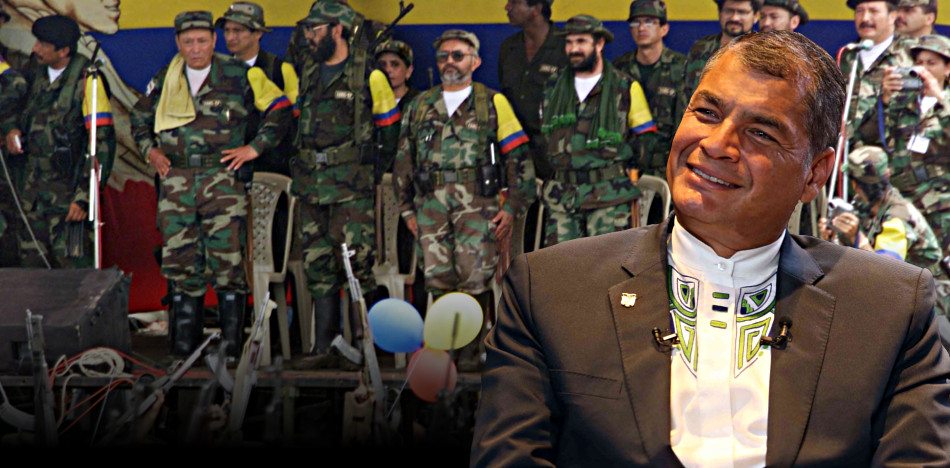
Alias ”Chorizo”, a former guerrilla of the FARC and now under witness protection by the Colombian justice system, has alleged that former Ecuadorian President Rafael Correa was financed by the FARC during his presidential campaigns.
Alexander “Chorizo” Duque, of the FARC’s 48th Front, stated during the Caracol program Los Informantes that FARC guerrillas voted in Ecuador for Correa during the presidential election. They negotiated an agreement whereby members of the FARC had indefinite permission to visit the FARC camp of top leader Raul Reyes, which was located close to the Colombian-Ecuadorian border, but within Ecuadorian territory. He added that the forced withdrawal of the US military base in Manta, in central coastal Ecuador, was part of the agreement in exchange for his financial support for Correa’s campaign.
“The funds in question were delivered directly to my house, in one installment of USD $200,000 and another of USD $300,000, with the express intent by Raul Reyes of financing the Rafael Correa campaign.”
He stated that he even worked in one of Rafael Correa’s campaigns: “I had to do work for the campaign, publicity, encouraging the people of Colombia who had Ecuadorian documents, and Ecuadorians who were from the FARC or militiamen to vote for Rafael Correa.”
Regarding the pact to remove the military base in Manta, “Chorizo” said that at the time that Correa became president he “immediately asked the United States to remove that base there because he was fulfilling the terms of the agreement with the FARC, and did not want to give the US the opportunity to renew the lease.”
After ten years of operations, in 2009 the bilateral cooperation agreement between the United States and Ecuador was terminated, prompting the departure of the US military from Ecuadorian territory.
Lenin Moreno and the investigation into Correa
The current president of Ecuador, Lenin Moreno, announced in April that Ecuador would no longer be the guarantor for the peace talks between the Colombian government and the guerrilla group Ejercito de Liberacion Nacional (ELN). He stated that he had also withdrawn Quito as the venue for the negotiations.
In the same statement, Moreno noted that he was ordering an investigation into the veracity of a video that involved Correa and the alleged financing of his political campaign by the FARC guerrillas.
“I have just seen a video…in which a protected witness provides evidence that the FARC gave money to the campaigns of former President Correa. I asked to verify its veracity,” he said.
Rumors of the possible relationship between Correa and the FARC, known as the farcpolitica scandal, intensified after a dissident element of the FARC, known as the Front Oliver Sinisterra, led by alias “Guacho”, murdered three Ecuadorian journalists from the newspaper El Comercio. The brazen act was followed by the kidnapping of an Ecuadorian couple on the border, near Colombia.
Correa and the growth of the FARC in the border region
For years, Hugo Chávez refused to classify the FARC as a terrorist group. Simultaneously, Correa did the same in Ecuador, alleging that while they were not a terrorist group, neither did they pertain to the status of enemy combatants. In an interview Correa clarified his thoughts on the FARC, suggesting that they constituted an “irregular army. No country in Latin America calls them terrorists, not even the Colombian government before Uribe,” he explained.
In “Operation Fenix”, which led to the death of Raúl Reyes, the Colombian military found a series of documents that established the relationship between Correa and the FARC. Particularly of interest was an email in which the guerrilla group congratulated Correa on his electoral triumph in 2007.
“We met with Minister of Security of Ecuador, Gustavo Larrea, henceforth known as ‘Juan’. On behalf of President Correa, he brought greetings to Comrade Manuel and the Secretariat…and expressed the president’s interest in formalizing relations with the FARC leadership through ‘Juan’. He discussed provisions to coordinate social activities to help the residents of the border region, and the exchange of information for control of paramilitary crime in their territory,” was the text of a letter allegedly written by Raul Reyes to members of the Secretariat, which was read in public by Uribe, on January 18, 2008.
Colombian military machinations triggered the 2008 Andean Diplomatic Crisis between Colombia and Ecuador, since Correa accused President Uribe of having invaded Ecuadorian territory, having violated Ecuador’s sovereignty, and breaking international treaties, in order to kill Raul Reyes.
In 2008, Correa denied having links with the FARC and asked for an investigation into the matter, assuring that if it were proven otherwise, he would resign, an eventuality which never occurred. As of that year, the Angostura Report on the case of the death of Raúl Reyes revealed that the Ecuadorean region in question is frequently used as a drug trafficking route.
In an interview with the PanAm Post, Johnny Estupiñán Echeverría, Vice Admiral of the Naval Force of Ecuador, retired from active duty since 2008, pointed out that Correa’s government was an accomplice of the FARC.
“Evidently they were allies and accomplices; all the actions of the previous government favored drug trafficking, fueled by aggressive and widespread corruption.”
Now that the current government wants to combat all illegal groups on Ecuadorian territory, it is logical to think that the link between the previous government and the narco-terrorists, even if indirectly, is generating terrorist actions to destabilize the current government,” he said.
 Versión Español
Versión Español












